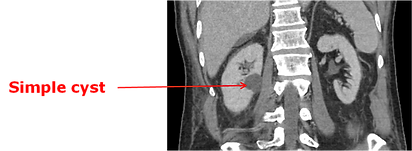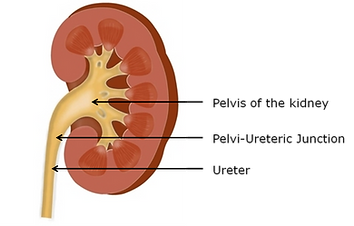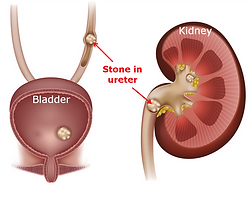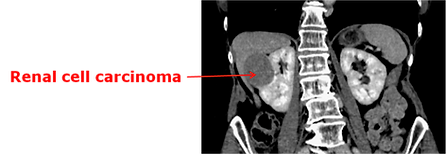KIDNEY CONDITIONS
KIDNEY CYSTS
A kidney cyst is a sac that is filled with clear fluid, the majority are simple cysts, each with a thin outside wall. Simple cysts are common and are discovered by chance in approximately half of patients above the age of 50 when having scans for other reasons.
It is unclear how and why simple cysts form and generally they cause no symptoms or harm, unless they are very large which can cause loin pain.
There is no need to treat most simple cysts; large symptomatic cysts can be treated surgically with laparoscopic (keyhole) de-roofing of the cyst.

What are complex renal cysts?
Occasionally cysts are regarded complex if they have a thick outside wall, calcifications, septa (divisions) or have a mass in the middle and there is a risk that some of these cysts might be cancer.
Treatment of complex cysts is dependent on many factors including how complex the cyst looks on the scan and individual circumstances. Treatment options may involve careful monitoring (surveillance) or surgery to remove the cyst (partial nephrectomy) or the kidney (radical nephrectomy).
PELVI-URETERIC JUNCTION (PUJ) OBSTRUCTION
PUJ is the junction between the pelvis of the kidney and the ureter (the tube between the kidney and the bladder). PUJ obstruction refers to narrowing of the junction resulting in obstruction to the flow of urine from the kidney to the ureter.
PUJ obstruction affects about one in every 1000 adults and tends to occur more in men. It is often caused by a congenital weakness in the wall of the junction and sometimes there is an extra blood vessel pressing on the junction from outside causing or contributing to the obstruction (known as accessory vessel). Occasionally PUJ obstruction is caused by a scar tissue following passage of a kidney stone or very rarely due to cancer.

What are the effects or symptoms of PUJ obstruction?
PUJ obstruction can cause recurrent episodes of loin pain, kidney infection (pyelonephritis) and kidney stones. Rarely it causes no symptoms and is discovered by chance when having a scan for another condition.
Treatment of PUJ obstruction
Treatment options for PUJ obstruction include active surveillance and surgery (laparoscopic pyeloplasty or benign nephrectomy).
KIDNEY STONES
Stones are a common problem and can be found either in the kidney or the ureter (tube between the kidney and the bladder). Approximately one in seven patients require treatment for kidney stones in UK and most commonly affects people between the ages of 30 and 60, although it can happen at to any age.
Stones often form when the urine is concentrated, encouraging minerals to form crystals, which then stick together to form stones.

What are the symptoms of kidney stones?
-
Loin pain: kidney stones may cause pain in the side of the abdomen.
-
Renal colic: if a stone becomes stuck while passing through the ureter (the tube between the kidney and the bladder), it can cause a distressing side pain that tends to come and go. The pain may spread down to the lower abdomen and often there is nausea (feeling sick) and sweating.
-
Blood in the urine (haematuria).
-
Infection: urinary tract infections are more common in people with kidney stones and can lead to pain, high temperature, burning when passing urine and needing to urinate more frequently.
Treatment of kidney stones
Kidney stones that are too large to pass naturally, often require surgery to break up and or remove. The main treatment option involves laser treatment via a telescope in the ureter (ureteroscopy and laser stone fragmentation). Some patients may benefit from shock wave or may require more invasive keyhole kidney surgery.
KIDNEY CANCER
Kidney cancer is the 8th most common cancer in adults in the UK, with over 12,500 people diagnosed each year and it is more common in patients above the age of 60 years.
The most common types of kidney cancer, which start from the cortex (outer part of the kidney), are renal cell carcinomas (RCC) which include clear cell, papillary and chromophobe renal cell carcinomas.
Kidney cancer can also develop in the lining of the kidney (renal pelvis) which is called urothelial cancer or transitional cell carcinoma (TCC).

Symptoms of kidney cancer
Around half of kidney cancer cases, particularly smaller cancers, do not usually cause symptoms and are diagnosed by chance when having scans for unrelated conditions. Some possible symptoms include blood in the urine, loin pain or a lump in the kidney area,
What are the causes of kidney cancer?
The exact cause of kidney cancer is unknown, but there are risk factors that can increase the chances of developing the condition which include:
-
Obesity (overweight).
-
Smoking.
-
Having a relative with kidney cancer.
-
Having a kidney condition requiring dialysis.
-
High blood pressure.
-
Certain inherited genetic conditions.
Treatment of kidney cancer
There are many treatment options for kidney cancer depending on individual circumstances and cancer characteristics. These include: surgery (laparoscopic radical nephrectomy, laparoscopic partial nephrectomy and cryosurgery) and biological or targeted therapy.